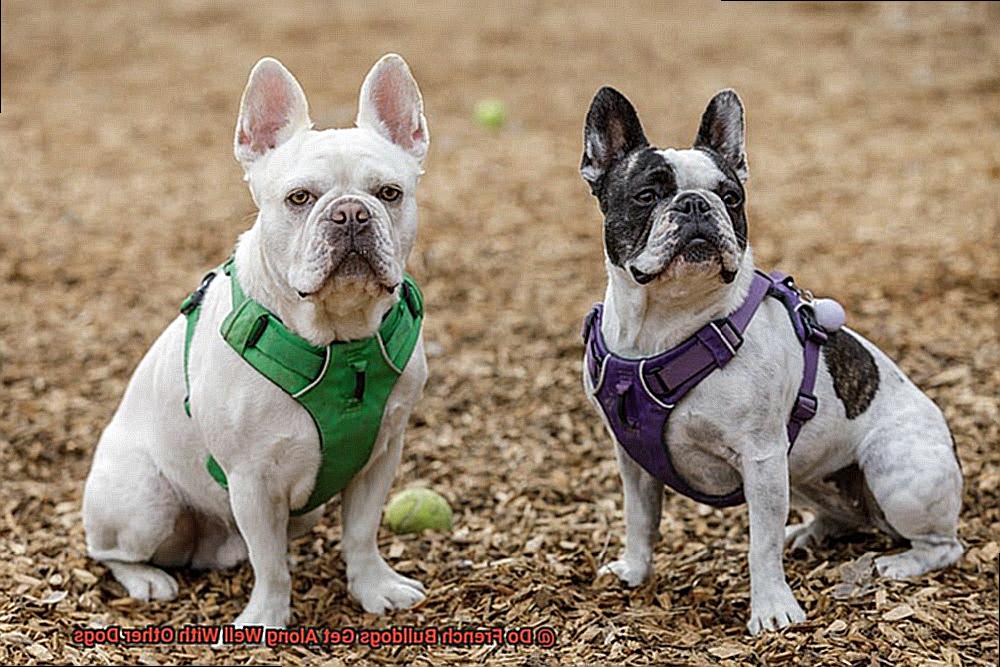Do French Bulldogs Get Along Well With Other Dogs?
French Bulldogs, with their adorable bat-like ears and expressive eyes, have captured the hearts of dog lovers worldwide. If you’re thinking about adding one of these charming pups to your furry family, you might be wondering how they get along with other dogs. Are they as friendly and sociable as they seem? Well, get ready for a delightful surprise as we delve into the captivating world of French Bulldog camaraderie with their canine counterparts.
Despite their small size, French Bulldogs possess a larger-than-life personality that makes them irresistible to social interaction. These four-legged trendsetters are often hailed as the social butterflies of the dog world, effortlessly winning over everyone they meet – both humans and furry friends alike. But what about their compatibility with other dogs? Let’s uncover their true nature and discover if French Bulldogs make perfect playmates for your existing canine companions.
Examining the Temperament of French Bulldogs
Contents
- 1 Examining the Temperament of French Bulldogs
- 2 The Benefits of Early Socialization for French Bulldogs
- 3 The Pack Mentality of French Bulldogs
- 4 Introducing a French Bulldog to Other Dogs
- 5 Gender and Size Differences When Introducing a French Bulldog to Another Dog
- 6 Training and Obedience Exercises for French Bulldogs
- 7 Possessive Tendencies in French Bulldogs
- 8 Supervising Playtime with Multiple Dogs
- 9 Conclusion
French Bulldogs, with their friendly and sociable nature, are known for being wonderful companions. However, when it comes to getting along with other dogs, their temperament can vary. In this blog post, we will explore the factors that influence the compatibility of French Bulldogs with other dogs. Whether you’re a proud owner of a French Bulldog or considering adding one to your family, understanding their temperament and how they interact with other dogs is essential for creating a harmonious environment.
Individual Personality:
Just like humans, each French Bulldog has a unique personality that can affect their interactions with other dogs. Some Frenchies may be outgoing and eager to socialize, while others may be more reserved or anxious. Take the time to observe and understand your French Bulldog’s individual personality to gauge their compatibility with other dogs.
Early Socialization:
Early socialization is crucial for French Bulldogs to develop positive interactions with other dogs. Exposing them to various environments and introducing them to different dogs from a young age helps them learn appropriate behaviors and become comfortable in social settings. Gradual exposure and positive reinforcement during socialization are key to fostering good relationships with other dogs.

Breed History and Genetic Predisposition:
French Bulldogs were originally bred as companion dogs and have a reputation for being friendly and affectionate towards humans. However, some Frenchies may exhibit dominant or territorial behavior towards other dogs, especially if they have not been properly trained or socialized. Understanding their breed history and genetic predispositions can help you address any potential issues and ensure compatibility with other dogs.
Gender and Age:
The gender and age of both the French Bulldog and the other dog can influence their compatibility. Some French Bulldogs may display more dominant behavior towards dogs of the same gender, while others may establish strong bonds regardless of gender. Similarly, younger French Bulldogs may have higher energy levels and playfulness, which may be appreciated or perceived differently by older or more laid-back dogs.
Introductions and Supervision:
When introducing your French Bulldog to other dogs, it is important to approach the process with caution and patience. Gradual introductions in neutral territory, such as a park, can help minimize conflicts or misunderstandings. Close supervision during the initial stages of interaction is crucial to ensure the safety and well-being of both dogs.
French Bulldogs are generally friendly and sociable dogs that can get along well with other dogs. Understanding their individual personality, early socialization experiences, breed history, and considering factors such as gender and age can help create a harmonious environment for your French Bulldog and other dogs.
With proper introductions, training, and supervision, you can unleash the friendly nature of your French Bulldog and foster positive relationships with other dogs.
The Benefits of Early Socialization for French Bulldogs
French Bulldogs are known for their friendly and sociable nature, but did you know that early socialization plays a crucial role in developing these traits? Socializing your French Bulldog from a young age has numerous benefits that contribute to their overall well-being and happiness. Let’s dive into some of the key advantages of early socialization for French Bulldogs.
- Developing Positive Relationships: Early socialization allows French Bulldogs to learn appropriate behaviors and communication skills when interacting with other dogs. By exposing them to different breeds, sizes, ages, and temperaments, they can develop tolerance and adaptability towards various types of dogs they may encounter throughout their lives.
- Preventing Aggression and Fear: Proper socialization helps prevent aggression or fear-based reactions towards other dogs. When French Bulldogs are exposed to positive experiences with other dogs early on, they are less likely to develop negative associations or defensive behaviors. This sets them up for a lifetime of friendly interactions and reduces the risk of aggression issues.
- Building Confidence: Socialization helps French Bulldogs become more confident and comfortable in different social settings. When they are exposed to various environments, people, and animals, they learn to adapt and become more self-assured. This reduces anxiety in new situations and promotes overall mental and emotional well-being.
- Enjoying Playtime: Well-socialized French Bulldogs are more likely to enjoy the company of other dogs and engage in friendly play. They learn how to communicate effectively, share toys, and take turns, making playtime more enjoyable for everyone involved.
To ensure successful socialization, it is important to start early, ideally between the ages of 8 to 12 weeks when puppies are most receptive to learning and adapting to new experiences. Gradual introductions and supervised playdates can help build confidence and develop good social skills.
Remember to use positive reinforcement training techniques during socialization sessions. Reward desired behaviors and encourage positive associations with other dogs. This will reinforce their positive experiences and help them develop into well-rounded and friendly French Bulldogs.
The Pack Mentality of French Bulldogs
French Bulldogs, known for their adorable bat-like ears and playful personalities, are social butterflies when it comes to their interactions with other dogs. These furry companions have a pack mentality that makes them thrive in the company of their fellow canines. So, if you’ve got a French Bulldog at home and you’re wondering about their ability to get along with other dogs, fear not. Let’s dive into the fascinating world of French Bulldog pack mentality.
Friendly and Tolerant by Nature
French Bulldogs are generally known for their friendly and sociable nature. They are like the life of the party, always ready to make new friends. These little social butterflies are usually very tolerant and accepting of different dog breeds and sizes. They won’t judge a book by its cover or a dog by its breed.
Playful Companions
French Bulldogs have a playful and affectionate nature that makes them more likely to get along well with other dogs. They enjoy engaging in interactive play sessions with their four-legged pals, whether it’s chasing balls like a lightning bolt or wrestling around like a couple of clowns in a circus ring. These playful interactions help them form strong bonds with their furry companions.
Early Socialization is Key
Just like humans, socialization is crucial for French Bulldogs too. Starting from a young age, expose your Frenchie to different dogs, environments, and situations. This will help them become well-adjusted and confident in social settings. Think of it as sending your little pup to puppy school where they can learn the art of making friends.
Mindful Monitoring
While French Bulldogs generally get along well with other dogs, it’s important to be mindful of their body language and behavior during introductions. Keep an eye out for signs of discomfort or anxiety, such as growling, snapping, or cowering. If you notice any of these signs, address them promptly to prevent conflicts and ensure a happy playtime for all.
Professional Guidance
If you’re facing any difficulties during introductions or have concerns about your French Bulldog’s behavior towards other dogs, don’t hesitate to seek the guidance of a professional dog trainer or behaviorist. These experts can provide you with tailored advice and techniques to address any issues and help foster positive relationships between your French Bulldog and their furry pals.
Introducing a French Bulldog to Other Dogs
French Bulldogs are known for their affectionate and friendly nature, making them great companions for both humans and other dogs. However, introducing your French Bulldog to other dogs requires careful consideration and preparation to ensure a positive experience for everyone involved. In this guide, we will walk you through the steps of introducing your French Bulldog to other dogs, providing you with the tools and knowledge to make these introductions a success.
Understand Your French Bulldog’s Personality
Before introducing your French Bulldog to other dogs, it’s important to understand their individual personality traits. Some French Bulldogs may be naturally sociable and eager to make new friends, while others may be more reserved or even wary of unfamiliar dogs. Take the time to observe your French Bulldog’s behavior in different social settings to gauge their comfort level and preferences.
Gradual Socialization Exercises
To help your French Bulldog become more comfortable around other dogs, start with gradual socialization exercises. This can involve exposing them to different environments, sights, sounds, and smells associated with other dogs. By gradually familiarizing them with these stimuli, you can help reduce any anxiety or fear they may have towards other dogs.
Choose a Neutral Location
When it comes time for the actual introduction, choose a neutral location where neither dog feels territorial or threatened. This can be a park or any open space away from your home or the other dog’s territory. A neutral location will help create a more relaxed environment for the initial meeting.
Observe Body Language
Allow the dogs to observe each other from a distance initially. This will give them an opportunity to assess one another’s body language and get comfortable in each other’s presence without feeling overwhelmed. Look for signs of relaxed body postures, wagging tails, and friendly curiosity as positive indicators that the dogs are receptive to meeting.
Controlled On-Leash Introduction
Once both dogs appear calm and relaxed during the observation phase, you can slowly move them closer together while keeping them on a leash. It’s important to remain calm and assertive during this process, as dogs can sense your energy and react accordingly. Keep the leash loose, as tension can transmit anxiety or aggression between the dogs.
Monitor Body Language
As the dogs get closer, carefully monitor their body language for any signs of discomfort or aggression. Stiff postures, raised hackles, growling, snarling, or intense staring are all signs that the dogs may be feeling threatened or uncomfortable. If any of these signs are present, separate the dogs and reassess the situation before proceeding.
Gender and Size Differences When Introducing a French Bulldog to Another Dog
Introducing your French Bulldog to another dog can be an exciting but nerve-wracking experience. To ensure a smooth introduction, it is important to consider gender and size differences. In this article, we will explore how these factors can impact the introduction process and provide tips for success.
Gender Differences:
French Bulldogs generally get along well with dogs of the opposite sex. Male French Bulldogs often have a relaxed and easygoing demeanor, making them more accepting of female dogs. However, it is essential to remember that individual personalities play a significant role in compatibility, regardless of gender.
Size Differences:
French Bulldogs are a small breed, which means they may feel intimidated or overwhelmed by larger dogs. To ensure a positive introduction, it is crucial to carefully monitor and control interactions. Gradual introductions in a neutral territory with both dogs on-leash can help establish positive associations and reduce fear or anxiety.
Socialization and Training:
Proper socialization and training are crucial for all dogs, including French Bulldogs. Early exposure to dogs of different sizes, genders, and breeds helps them become more comfortable and confident in their interactions. Enroll your French Bulldog in puppy classes or organize playdates with well-behaved dogs to enhance their social skills.
Individual Preferences:
Each dog has its own unique personality and preferences. While some French Bulldogs may enjoy the company of other dogs, others may prefer their own space. It is important to respect each dog’s boundaries and provide opportunities for breaks or retreat if they feel overwhelmed or stressed during interactions.
Supervision and Management:
Regardless of gender or size differences, close supervision and management are essential when introducing your French Bulldog to another dog. Watch for signs of discomfort or aggression from either dog, and intervene if necessary. Providing each dog with their own space and resources helps prevent conflicts over food, toys, or resting areas.
Training and Obedience Exercises for French Bulldogs
Training and obedience exercises are crucial for every dog, and French Bulldogs are no exception. These intelligent and lovable companions can easily learn and excel in training if done with consistency, patience, and positive reinforcement. In this comprehensive guide, we will explore the importance of training and socialization for French Bulldogs, providing you with practical tips and insights to help you raise a well-behaved and obedient Frenchie.
Start Early: Establishing Good Habits
Training your French Bulldog from an early age is essential to establish good behavior habits and prevent potential behavioral issues. Start with basic obedience commands such as sit, stay, come, and walking on a leash. Use positive reinforcement techniques like treats, praise, and rewards to motivate and encourage your Frenchie during training sessions.
Keep It Fun and Short
French Bulldogs have a relatively short attention span, so it’s important to keep training sessions short and fun. Aim for sessions that last no longer than 10-15 minutes, focusing on one command at a time. Remember to end each session on a positive note, rewarding your Frenchie with praise or treats.
Consistency is Key
Consistency is crucial when training French Bulldogs. Use the same commands and hand signals consistently to avoid confusion. Establish a routine for feeding, exercise, and training, which will help your Frenchie understand what is expected of them.
Socialization: The Key to a Well-Adjusted Frenchie
Socialization is essential for French Bulldogs to ensure they get along well with other dogs and people. Expose your Frenchie to different environments, people, and other dogs from a young age. Gradually introduce them to other dogs in controlled and calm settings, starting with calm and friendly dogs before progressing to more challenging situations.
Obedience Exercises for Socialization
Incorporate obedience exercises into socialization sessions to reinforce good behavior and teach your Frenchie appropriate manners when interacting with other dogs. Commands such as “leave it,” “stay,” and “come” can be helpful in managing your Frenchie’s behavior during social interactions.
Supervise Interactions
Always supervise interactions between your Frenchie and other dogs to ensure safety and prevent any aggressive behavior. If your Frenchie shows signs of aggression or discomfort around other dogs, consult with a professional dog trainer or behaviorist for guidance on how to address the issue.
Possessive Tendencies in French Bulldogs
French Bulldogs are known for their adorable and affectionate nature, but they can also exhibit possessive tendencies, particularly when it comes to their toys, food, and personal space. As a responsible owner, it is important to understand and address these tendencies early on to prevent any potential issues or conflicts with other dogs. In this guide, we will explore the common areas where possessive tendencies may arise and provide tips on how to address and manage them.
Mealtime Matters: Establishing Boundaries
During mealtime, French Bulldogs may become protective of their food and show aggression or growl at other dogs who come too close to their food bowl. To address this possessive behavior, it is crucial to establish clear boundaries and rules around mealtime. Here’s what you can do:
- Have a designated feeding area: Create a designated feeding area for your French Bulldog and ensure that other dogs respect this space.
- Teach the “leave it” command: Train your French Bulldog to respond to the “leave it” command, which will help redirect their attention away from their food and discourage possessiveness.
- Practice controlled feeding: Start by feeding your French Bulldog in a separate room or crate to prevent any conflicts with other dogs. Gradually introduce supervised mealtime with other dogs once they are more comfortable and less possessive.
Toys: Encouraging Sharing and Playtime
French Bulldogs may also become possessive over their favorite toys and may not want to share them with other dogs. To encourage sharing and prevent possessiveness over toys:
- Provide multiple toys: Make sure your French Bulldog has access to a variety of toys to prevent them from becoming too attached to one specific toy.
- Supervised playtime: Engage in supervised playtime with other dogs, encouraging your French Bulldog to share toys and take turns.
- Positive reinforcement: Reward your French Bulldog with treats and praise when they exhibit sharing behavior, reinforcing positive associations with sharing and playtime.
Personal Space: Teaching Boundaries
French Bulldogs may exhibit possessive tendencies when it comes to their personal space, such as their bed or favorite spot on the couch. Here’s how you can teach them boundaries:
- Establish clear boundaries: Set clear rules and boundaries around personal space, making it clear that other dogs are allowed in that space as long as they are not being threatened.
- Positive reinforcement: Reward your French Bulldog when they allow other dogs into their personal space without showing possessiveness or aggression.
- Gradual desensitization: If your French Bulldog is particularly possessive over their personal space, gradually introduce other dogs into that space in a controlled manner, rewarding positive behavior and intervening if possessiveness arises.
Supervising Playtime with Multiple Dogs
French Bulldogs are known for their friendly and sociable nature. They can often get along well with other dogs and enjoy playtime with their furry pals. However, it’s important to remember that not all dogs are a perfect match, and supervision during playtime is crucial to ensure everyone’s safety and happiness.
Creating a Paws-itive Play Environment
To set the stage for successful playtime, it’s essential to establish a calm and controlled environment. Here are some key steps to follow:
- Designate a dedicated play area: Clear any potential hazards or distractions from the space where your French Bulldog will be playing with other dogs. This helps prevent accidents and keeps the focus on fun.
- Get to know each dog’s temperament: Just like humans, dogs have unique personalities. Understanding their quirks and behaviors can help anticipate any potential issues and prevent conflicts from escalating.
- Introduce dogs gradually: Take it slow. Start by allowing the dogs to sniff and observe each other from a distance. As they become more comfortable, bring them closer together while closely monitoring their body language.
Speak Doggy Language: Decoding Canine Communication
During playtime, it’s crucial to pay attention to the body language of all the dogs involved. Here are some signs that may indicate discomfort or stress:
- Stiff body posture: If a dog looks tense or rigid, it could be a sign of unease.
- Raised hackles: When the fur along a dog’s back stands up, it can indicate aggression or fear.
- Growling or snapping: These vocalizations are clear signs of distress or potential aggression.
If you spot any of these signals, it’s essential to intervene immediately. Separating the dogs and redirecting their attention to more positive activities can help diffuse tension and prevent any unfortunate incidents.
Toys, Toys, Toys: Keeping Everyone Engaged
Providing plenty of toys and activities during playtime is a great way to keep the dogs engaged and prevent boredom. It also helps reduce the likelihood of conflicts arising from resource guarding or competition for toys. Make sure there are enough toys to go around, and consider rotating them to keep things exciting.
Size Does Matter: Considering Compatibility
French Bulldogs are a smaller breed, and their size should be taken into account when selecting playmates. Playing with larger or highly energetic dogs can put them at a disadvantage and increase the risk of injuries. Consider finding dogs with similar size and energy levels to ensure a more balanced play experience.
Safety First: Being Prepared for the Unexpected
Even with proper supervision, conflicts can still arise between dogs. It’s essential to have a plan in place to safely separate the dogs if needed. Techniques like distraction, positive reinforcement, or physically blocking access between the dogs can be effective tools in diffusing tense situations.
Conclusion
In conclusion, French Bulldogs generally have a friendly and sociable nature, making them quite compatible with other dogs.
They tend to get along well with their furry counterparts, forming strong bonds and enjoying playful interactions. With proper socialization and training, French Bulldogs can thrive in multi-dog households and even become best buddies with their canine companions.
Therefore, it is crucial to introduce French Bulldogs to new dogs gradually and monitor their interactions to ensure harmony within the pack.




